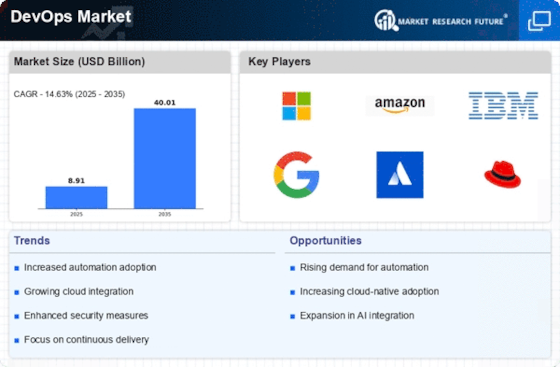Cloud-Based
On-Premises
Hybrid
Consulting Services
Implementation Services
Support Maintenance
IT Telecommunications
BFSI
Retail
Healthcare
Government
Continuous Integration Tools
Configuration Management Tools
Monitoring Reporting Tools
Collaboration Tools
North America
Europe
South America
Asia Pacific
Middle East and Africa
North America Outlook (USD Billion, 2019-2035)
North America DevOps Market by Deployment Type
Cloud-Based
On-Premises
Hybrid
North America DevOps Market by Service Type
Consulting Services
Implementation Services
Support Maintenance
North America DevOps Market by End User Type
IT Telecommunications
BFSI
Retail
Healthcare
Government
North America DevOps Market by Tools Type
Continuous Integration Tools
Configuration Management Tools
Monitoring Reporting Tools
Collaboration Tools
North America DevOps Market by Regional Type
US
Canada
US Outlook (USD Billion, 2019-2035)
US DevOps Market by Deployment Type
Cloud-Based
On-Premises
Hybrid
US DevOps Market by Service Type
Consulting Services
Implementation Services
Support Maintenance
US DevOps Market by End User Type
IT Telecommunications
BFSI
Retail
Healthcare
Government
US DevOps Market by Tools Type
Continuous Integration Tools
Configuration Management Tools
Monitoring Reporting Tools
Collaboration Tools
CANADA Outlook (USD Billion, 2019-2035)
CANADA DevOps Market by Deployment Type
Cloud-Based
On-Premises
Hybrid
CANADA DevOps Market by Service Type
Consulting Services
Implementation Services
Support Maintenance
CANADA DevOps Market by End User Type
IT Telecommunications
BFSI
Retail
Healthcare
Government
CANADA DevOps Market by Tools Type
Continuous Integration Tools
Configuration Management Tools
Monitoring Reporting Tools
Collaboration Tools
Europe Outlook (USD Billion, 2019-2035)
Europe DevOps Market by Deployment Type
Cloud-Based
On-Premises
Hybrid
Europe DevOps Market by Service Type
Consulting Services
Implementation Services
Support Maintenance
Europe DevOps Market by End User Type
IT Telecommunications
BFSI
Retail
Healthcare
Government
Europe DevOps Market by Tools Type
Continuous Integration Tools
Configuration Management Tools
Monitoring Reporting Tools
Collaboration Tools
Europe DevOps Market by Regional Type
Germany
UK
France
Russia
Italy
Spain
Rest of Europe
GERMANY Outlook (USD Billion, 2019-2035)
GERMANY DevOps Market by Deployment Type
Cloud-Based
On-Premises
Hybrid
GERMANY DevOps Market by Service Type
Consulting Services
Implementation Services
Support Maintenance
GERMANY DevOps Market by End User Type
IT Telecommunications
BFSI
Retail
Healthcare
Government
GERMANY DevOps Market by Tools Type
Continuous Integration Tools
Configuration Management Tools
Monitoring Reporting Tools
Collaboration Tools
UK Outlook (USD Billion, 2019-2035)
UK DevOps Market by Deployment Type
Cloud-Based
On-Premises
Hybrid
UK DevOps Market by Service Type
Consulting Services
Implementation Services
Support Maintenance
UK DevOps Market by End User Type
IT Telecommunications
BFSI
Retail
Healthcare
Government
UK DevOps Market by Tools Type
Continuous Integration Tools
Configuration Management Tools
Monitoring Reporting Tools
Collaboration Tools
FRANCE Outlook (USD Billion, 2019-2035)
FRANCE DevOps Market by Deployment Type
Cloud-Based
On-Premises
Hybrid
FRANCE DevOps Market by Service Type
Consulting Services
Implementation Services
Support Maintenance
FRANCE DevOps Market by End User Type
IT Telecommunications
BFSI
Retail
Healthcare
Government
FRANCE DevOps Market by Tools Type
Continuous Integration Tools
Configuration Management Tools
Monitoring Reporting Tools
Collaboration Tools
RUSSIA Outlook (USD Billion, 2019-2035)
RUSSIA DevOps Market by Deployment Type
Cloud-Based
On-Premises
Hybrid
RUSSIA DevOps Market by Service Type
Consulting Services
Implementation Services
Support Maintenance
RUSSIA DevOps Market by End User Type
IT Telecommunications
BFSI
Retail
Healthcare
Government
RUSSIA DevOps Market by Tools Type
Continuous Integration Tools
Configuration Management Tools
Monitoring Reporting Tools
Collaboration Tools
ITALY Outlook (USD Billion, 2019-2035)
ITALY DevOps Market by Deployment Type
Cloud-Based
On-Premises
Hybrid
ITALY DevOps Market by Service Type
Consulting Services
Implementation Services
Support Maintenance
ITALY DevOps Market by End User Type
IT Telecommunications
BFSI
Retail
Healthcare
Government
ITALY DevOps Market by Tools Type
Continuous Integration Tools
Configuration Management Tools
Monitoring Reporting Tools
Collaboration Tools
SPAIN Outlook (USD Billion, 2019-2035)
SPAIN DevOps Market by Deployment Type
Cloud-Based
On-Premises
Hybrid
SPAIN DevOps Market by Service Type
Consulting Services
Implementation Services
Support Maintenance
SPAIN DevOps Market by End User Type
IT Telecommunications
BFSI
Retail
Healthcare
Government
SPAIN DevOps Market by Tools Type
Continuous Integration Tools
Configuration Management Tools
Monitoring Reporting Tools
Collaboration Tools
REST OF EUROPE Outlook (USD Billion, 2019-2035)
REST OF EUROPE DevOps Market by Deployment Type
Cloud-Based
On-Premises
Hybrid
REST OF EUROPE DevOps Market by Service Type
Consulting Services
Implementation Services
Support Maintenance
REST OF EUROPE DevOps Market by End User Type
IT Telecommunications
BFSI
Retail
Healthcare
Government
REST OF EUROPE DevOps Market by Tools Type
Continuous Integration Tools
Configuration Management Tools
Monitoring Reporting Tools
Collaboration Tools
APAC Outlook (USD Billion, 2019-2035)
APAC DevOps Market by Deployment Type
Cloud-Based
On-Premises
Hybrid
APAC DevOps Market by Service Type
Consulting Services
Implementation Services
Support Maintenance
APAC DevOps Market by End User Type
IT Telecommunications
BFSI
Retail
Healthcare
Government
APAC DevOps Market by Tools Type
Continuous Integration Tools
Configuration Management Tools
Monitoring Reporting Tools
Collaboration Tools
APAC DevOps Market by Regional Type
China
India
Japan
South Korea
Malaysia
Thailand
Indonesia
Rest of APAC
CHINA Outlook (USD Billion, 2019-2035)
CHINA DevOps Market by Deployment Type
Cloud-Based
On-Premises
Hybrid
CHINA DevOps Market by Service Type
Consulting Services
Implementation Services
Support Maintenance
CHINA DevOps Market by End User Type
IT Telecommunications
BFSI
Retail
Healthcare
Government
CHINA DevOps Market by Tools Type
Continuous Integration Tools
Configuration Management Tools
Monitoring Reporting Tools
Collaboration Tools
INDIA Outlook (USD Billion, 2019-2035)
INDIA DevOps Market by Deployment Type
Cloud-Based
On-Premises
Hybrid
INDIA DevOps Market by Service Type
Consulting Services
Implementation Services
Support Maintenance
INDIA DevOps Market by End User Type
IT Telecommunications
BFSI
Retail
Healthcare
Government
INDIA DevOps Market by Tools Type
Continuous Integration Tools
Configuration Management Tools
Monitoring Reporting Tools
Collaboration Tools
JAPAN Outlook (USD Billion, 2019-2035)
JAPAN DevOps Market by Deployment Type
Cloud-Based
On-Premises
Hybrid
JAPAN DevOps Market by Service Type
Consulting Services
Implementation Services
Support Maintenance
JAPAN DevOps Market by End User Type
IT Telecommunications
BFSI
Retail
Healthcare
Government
JAPAN DevOps Market by Tools Type
Continuous Integration Tools
Configuration Management Tools
Monitoring Reporting Tools
Collaboration Tools
SOUTH KOREA Outlook (USD Billion, 2019-2035)
SOUTH KOREA DevOps Market by Deployment Type
Cloud-Based
On-Premises
Hybrid
SOUTH KOREA DevOps Market by Service Type
Consulting Services
Implementation Services
Support Maintenance
SOUTH KOREA DevOps Market by End User Type
IT Telecommunications
BFSI
Retail
Healthcare
Government
SOUTH KOREA DevOps Market by Tools Type
Continuous Integration Tools
Configuration Management Tools
Monitoring Reporting Tools
Collaboration Tools
MALAYSIA Outlook (USD Billion, 2019-2035)
MALAYSIA DevOps Market by Deployment Type
Cloud-Based
On-Premises
Hybrid
MALAYSIA DevOps Market by Service Type
Consulting Services
Implementation Services
Support Maintenance
MALAYSIA DevOps Market by End User Type
IT Telecommunications
BFSI
Retail
Healthcare
Government
MALAYSIA DevOps Market by Tools Type
Continuous Integration Tools
Configuration Management Tools
Monitoring Reporting Tools
Collaboration Tools
THAILAND Outlook (USD Billion, 2019-2035)
THAILAND DevOps Market by Deployment Type
Cloud-Based
On-Premises
Hybrid
THAILAND DevOps Market by Service Type
Consulting Services
Implementation Services
Support Maintenance
THAILAND DevOps Market by End User Type
IT Telecommunications
BFSI
Retail
Healthcare
Government
THAILAND DevOps Market by Tools Type
Continuous Integration Tools
Configuration Management Tools
Monitoring Reporting Tools
Collaboration Tools
INDONESIA Outlook (USD Billion, 2019-2035)
INDONESIA DevOps Market by Deployment Type
Cloud-Based
On-Premises
Hybrid
INDONESIA DevOps Market by Service Type
Consulting Services
Implementation Services
Support Maintenance
INDONESIA DevOps Market by End User Type
IT Telecommunications
BFSI
Retail
Healthcare
Government
INDONESIA DevOps Market by Tools Type
Continuous Integration Tools
Configuration Management Tools
Monitoring Reporting Tools
Collaboration Tools
REST OF APAC Outlook (USD Billion, 2019-2035)
REST OF APAC DevOps Market by Deployment Type
Cloud-Based
On-Premises
Hybrid
REST OF APAC DevOps Market by Service Type
Consulting Services
Implementation Services
Support Maintenance
REST OF APAC DevOps Market by End User Type
IT Telecommunications
BFSI
Retail
Healthcare
Government
REST OF APAC DevOps Market by Tools Type
Continuous Integration Tools
Configuration Management Tools
Monitoring Reporting Tools
Collaboration Tools
South America Outlook (USD Billion, 2019-2035)
South America DevOps Market by Deployment Type
Cloud-Based
On-Premises
Hybrid
South America DevOps Market by Service Type
Consulting Services
Implementation Services
Support Maintenance
South America DevOps Market by End User Type
IT Telecommunications
BFSI
Retail
Healthcare
Government
South America DevOps Market by Tools Type
Continuous Integration Tools
Configuration Management Tools
Monitoring Reporting Tools
Collaboration Tools
South America DevOps Market by Regional Type
Brazil
Mexico
Argentina
Rest of South America
BRAZIL Outlook (USD Billion, 2019-2035)
BRAZIL DevOps Market by Deployment Type
Cloud-Based
On-Premises
Hybrid
BRAZIL DevOps Market by Service Type
Consulting Services
Implementation Services
Support Maintenance
BRAZIL DevOps Market by End User Type
IT Telecommunications
BFSI
Retail
Healthcare
Government
BRAZIL DevOps Market by Tools Type
Continuous Integration Tools
Configuration Management Tools
Monitoring Reporting Tools
Collaboration Tools
MEXICO Outlook (USD Billion, 2019-2035)
MEXICO DevOps Market by Deployment Type
Cloud-Based
On-Premises
Hybrid
MEXICO DevOps Market by Service Type
Consulting Services
Implementation Services
Support Maintenance
MEXICO DevOps Market by End User Type
IT Telecommunications
BFSI
Retail
Healthcare
Government
MEXICO DevOps Market by Tools Type
Continuous Integration Tools
Configuration Management Tools
Monitoring Reporting Tools
Collaboration Tools
ARGENTINA Outlook (USD Billion, 2019-2035)
ARGENTINA DevOps Market by Deployment Type
Cloud-Based
On-Premises
Hybrid
ARGENTINA DevOps Market by Service Type
Consulting Services
Implementation Services
Support Maintenance
ARGENTINA DevOps Market by End User Type
IT Telecommunications
BFSI
Retail
Healthcare
Government
ARGENTINA DevOps Market by Tools Type
Continuous Integration Tools
Configuration Management Tools
Monitoring Reporting Tools
Collaboration Tools
REST OF SOUTH AMERICA Outlook (USD Billion, 2019-2035)
REST OF SOUTH AMERICA DevOps Market by Deployment Type
Cloud-Based
On-Premises
Hybrid
REST OF SOUTH AMERICA DevOps Market by Service Type
Consulting Services
Implementation Services
Support Maintenance
REST OF SOUTH AMERICA DevOps Market by End User Type
IT Telecommunications
BFSI
Retail
Healthcare
Government
REST OF SOUTH AMERICA DevOps Market by Tools Type
Continuous Integration Tools
Configuration Management Tools
Monitoring Reporting Tools
Collaboration Tools
MEA Outlook (USD Billion, 2019-2035)
MEA DevOps Market by Deployment Type
Cloud-Based
On-Premises
Hybrid
MEA DevOps Market by Service Type
Consulting Services
Implementation Services
Support Maintenance
MEA DevOps Market by End User Type
IT Telecommunications
BFSI
Retail
Healthcare
Government
MEA DevOps Market by Tools Type
Continuous Integration Tools
Configuration Management Tools
Monitoring Reporting Tools
Collaboration Tools
MEA DevOps Market by Regional Type
GCC Countries
South Africa
Rest of MEA
GCC COUNTRIES Outlook (USD Billion, 2019-2035)
GCC COUNTRIES DevOps Market by Deployment Type
Cloud-Based
On-Premises
Hybrid
GCC COUNTRIES DevOps Market by Service Type
Consulting Services
Implementation Services
Support Maintenance
GCC COUNTRIES DevOps Market by End User Type
IT Telecommunications
BFSI
Retail
Healthcare
Government
GCC COUNTRIES DevOps Market by Tools Type
Continuous Integration Tools
Configuration Management Tools
Monitoring Reporting Tools
Collaboration Tools
SOUTH AFRICA Outlook (USD Billion, 2019-2035)
SOUTH AFRICA DevOps Market by Deployment Type
Cloud-Based
On-Premises
Hybrid
SOUTH AFRICA DevOps Market by Service Type
Consulting Services
Implementation Services
Support Maintenance
SOUTH AFRICA DevOps Market by End User Type
IT Telecommunications
BFSI
Retail
Healthcare
Government
SOUTH AFRICA DevOps Market by Tools Type
Continuous Integration Tools
Configuration Management Tools
Monitoring Reporting Tools
Collaboration Tools
REST OF MEA Outlook (USD Billion, 2019-2035)
REST OF MEA DevOps Market by Deployment Type
Cloud-Based
On-Premises
Hybrid
REST OF MEA DevOps Market by Service Type
Consulting Services
Implementation Services
Support Maintenance
REST OF MEA DevOps Market by End User Type
IT Telecommunications
BFSI
Retail
Healthcare
Government
REST OF MEA DevOps Market by Tools Type
Continuous Integration Tools
Configuration Management Tools
Monitoring Reporting Tools
Collaboration Tools


















Leave a Comment